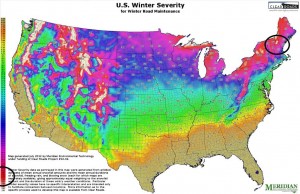5 Reasons N.H.’s Roads Are Looking Beat Up
Part II of our Roads series.
This week on StateImpact NH: a three-part series on roads. Transportation funding is a big issue in the legislature this session. A fifteen-cent gas tax has gotten initial support in the House, and advocates of high stakes gambling in New Hampshire say a portion of the revenue from a casino would go directly into the state’s Highway Fund. But getting either proposal through both chambers will be a doozy. So, we’re digging into roads.
First, we looked at just how bad our roads are. Today, we’ll tell you the 5 reasons our roads are looking beat up. And finally, we’ll look at what that means for your car, your pocketbook, and your safety.
Also, share your road story.
Those potholes you swerve around every day are caused by a confluence of variables. But mostly, it comes down to water, oil and money.
1. It’s all about water.
The kind of weather we’ve seen this winter – a lot of precipitation combined with frequent freezing and thawing and extreme temperatures – will destroy roads, fast. New Hampshire has a lot of frost-susceptible soil, says Jo Daniel of UNH’s Department of Civil Engineering. When rain or melted snow freezes, it forms an “ice lens” in the soil beneath the pavement that pushes up the asphalt causing frost heaves, and ultimately potholes. Not only do the frequent freezing and thawing that we’ve seen recently in New Hampshire degrade roads, but so do the extreme temperatures we saw earlier in the season – when highs near 60 followed lows in the single digits, in less than a week’s span.
2. And geography.
On top of that, New Hampshire is located in one of the worst parts of the country for winter road maintenance. Plowing snow and salting roads takes a $39 million bite out of what would otherwise be road repair budgets, according to the New Hampshire Department of Transportation.

NHDOT
New Hampshire is in one of the most costly parts of the country for winter road maintenance. Plowing costs often eat at paving budgets.
3. Is climate change affecting infrastructure?
Jo Daniel, a civil engineer at UNH, says yes – so far mostly from the increased flooding of the last few years. But rising temperatures could also affect the state’s roads. Right now, Daniel is just beginning a collaborative project between civil engineers and climate scientists in New England. They’re looking at how public works departments may need to address increasing temperatures and extreme weather events.
Meanwhile, vacillating temperatures – which are bad for roads — may be getting more frequent in this region. The Northeast Regional Climate Center recently supplied us with freeze/thaw cycle trends in Concord, which show that the number of days with both above and below freezing temperatures has been steadily increasing over the last twenty years for most winter months. Those trends did not hold true in the North Country, where temperatures are lower altogether.

Jessica Rennells / Northeast Regional Climate Center
Freeze-Thaw cyles (the number of days in a month with both above- and below- freezing temperatures) have increased in frequency in central NH most winter months over the last twenty years.
4. Oil prices aren’t good for roads.
The price of oil has been rising exponentially, which means the price of asphalt – a form of petroleum – has increased. And for the same reason, transporting that asphalt has gotten more expensive, too. In fact, asphalt costs almost five times as much today than it did twenty years ago, while transportation costs have tripled.
5. Money, money, money.
But the real kicker is funding. Bill Boynton at NHDOT is quick to tell you that while all of those paving costs have been going up, the actual dollars New Hampshire has to spend on road infrastructure has been shrinking. The gas tax hasn’t been raised in the state since 1992. In the meantime, the dollar is worth less than 60 percent of what it was when the rate was set; fuel efficient cars have meant that people are buying less gas overall; and vehicle miles traveled have increased by 30 percent – putting more wear and tear on already under-maintained roads.
But when it comes to road money, towns may be hurting even more than the state. While the state relies on funds from turnpike tolls, motor vehicle registration fees, and about $144 million each year from the federal highway program in addition to the state gas tax, towns are looking at only two sources of revenue: property taxes, and highway block grants from the state’s highway fund. This year, the state is distributing to towns almost $4.5 million less than it did last year. Which may be contributing to the fact that while the state is on course to repave state roads every 13 years – three years later than NHDOT would like – many towns say they’re looking at a 100-year paving plan.
Stay tuned tomorrow for more on New Hampshire’s roads.

